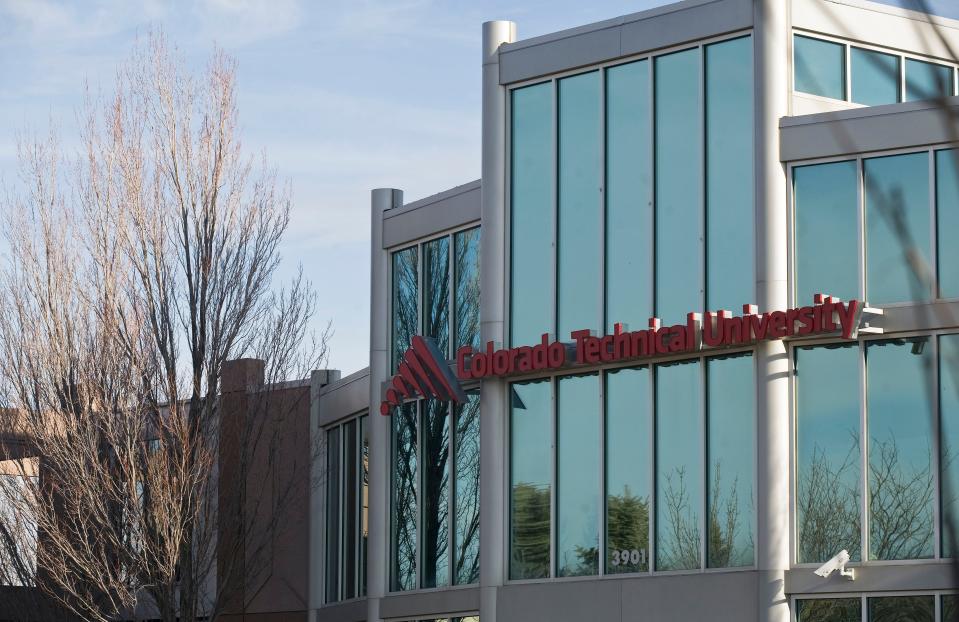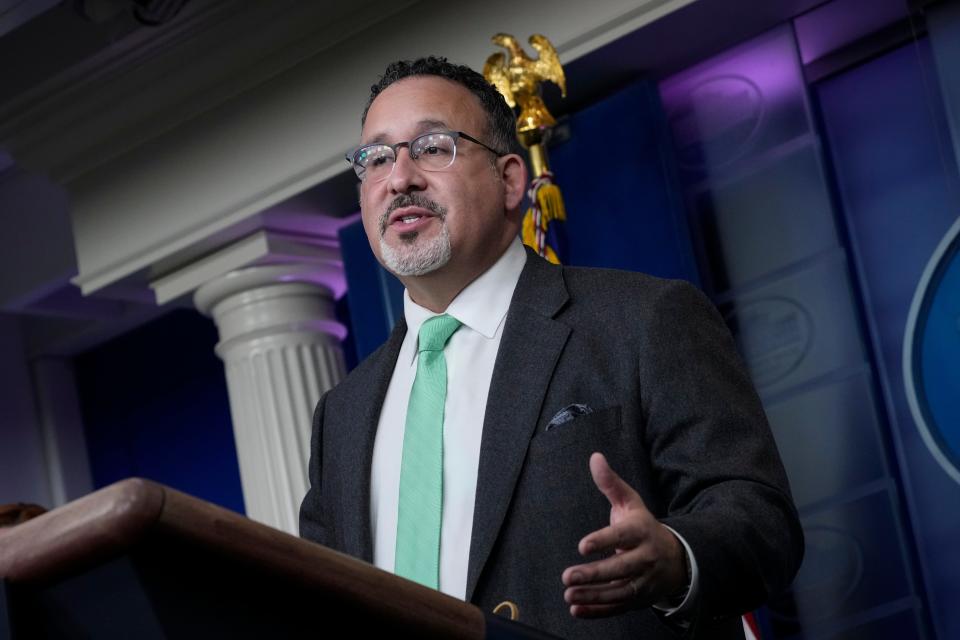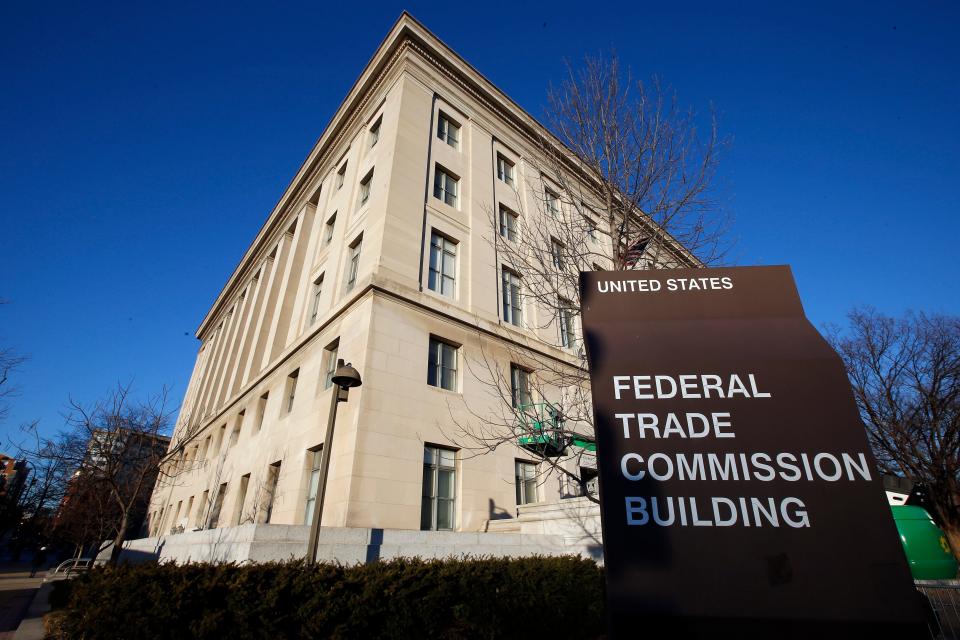Online college accused of recruiting unprepared students, pocketing money – despite sanctions

Aidan Peters knows how college advisers can change students’ lives. An adviser at the community college he attended helped him apply for financial aid and complete his degree, an achievement he said changed his life for the better.
He also knows the damage college advisers can inflict. Through emotional manipulation or simple deception, they can steer students toward expensive degrees that could turn out to be worthless.
Peters, 32, knows the perils because he spent four years as an adviser for Colorado Technical University, a for-profit college owned by a private company that’s had repeated run-ins with federal regulators. Though he was initially excited about the prospect to “really make a difference,” Peters soured on the job in 2020.
“I left because I could no longer participate in defrauding students, which is exactly what CTU required of us,” Peters wrote in a legal declaration. “I could not be a part of any more lies or omissions to students to get them to enroll.”
His experience offers firsthand insight into the recruitment tactics used by some colleges to enroll students, many of them older adults who are unfamiliar with the application process. Colleges turn these students’ federal grants and loans into profits.

Peters started documenting his experiences while still employed at the company, after his superiors chastised him for raising concerns over what he saw as illegal behavior. When he left, he connected with an attorney and drafted a legal declaration with details gathered from 2016 to 2020. He declined to say whether he planned to file a lawsuit.
Over 44 pages, he claimed advisers enrolled students who didn’t have working computers to complete their online coursework. In other cases, they enrolled students who had never earned a high school diploma or a GED. Advisers called prospective students repeatedly, sometimes multiple times a day, to try to get them to relent and sign up. Sometimes, Peters wrote, he recruited potential students who could not read or write at a college level.
“The student could not know how to put a sentence together or may not know how to do anything you are telling them,” Peters wrote.
It didn’t matter to CTU, he said, as long as the student started the semester. Students’ long-term success was unimportant so long as advisers met short-term enrollment goals.
Thinking of college?Here's how to avoid a predatory institution
Several people connected with Colorado Technical University – former students and advisers and one current professor – told USA TODAY they'd had experiences much like the ones Peters described.
Peters and his attorney said they shared his declaration with federal agencies and state attorneys general that are supposed to protect students from predatory institutions. Several agencies declined to comment on his allegations, and Perdoceo Education, which owns CTU, did not respond to USA TODAY's repeated requests for comment.
After this story's publication, Colorado Technical's verified Twitter account responded to some users who had shared the story. "The University takes all claims related to student and employee experience seriously," the response read. "We believe that we have demonstrated we are in full compliance."
USA TODAY obtained an internal email indicating the Education Department requested information from Perdoceo’s campuses in December. The email put staff on notice to retain documents tied to student recruitment, financial aid, marketing and other topics related to enrollment – a practice that points to a pending investigation.
The department declined to confirm the inquiry but said it was committed to ensuring all colleges "are held to rigorous oversight standards, and work to promote good outcomes for students."

Perdoceo reported a $27.8 million net profit in the third quarter. “We continued to focus on serving and educating our students while adjusting our processes and continuing to prioritize academic outcomes and retention of our students,” said Todd Nelson, who was the company’s CEO until last month and remains the executive chairman of the board.
‘Little incentive to ensure student success’
Many for-profit colleges are honest institutions that strive to provide a workforce-ready education. Some provide crucial pathways to students otherwise ignored by more selective universities.
Critics of for-profits say they often have poor graduation rates and leave students with more debt compared with their public or nonprofit peers. They tell stories like Peters’, saying the colleges often enroll students who aren’t prepared for their coursework, fail to support them and care largely about pocketing their grant or loan money. The high-profile closure of several large for-profit institutions in the past decade has led to calls for more federal scrutiny.
A few agencies introduced plans to provide that oversight but have yet to show progress.
In 2021, the Federal Trade Commission sent warning letters to more than 70 for-profit universities, including Colorado Technical, announcing its intent to crack down on misleading job placement rates. The FTC has taken no further action.

The Education Department said it would increase its oversight of colleges that mislead students, and the agency was still staffing an enforcement branch.
Most recently, Democratic lawmakers moved to shut for-profit colleges out of a possible increase to the Pell Grant, a scholarship for low-income Americans, as a part of the president's Build Back Better spending bill. Research suggests for-profit colleges raise tuition to meet increases in federal aid, said Stephanie Cellini, a professor of economics at George Washington University.
“Under our current system, there’s a strong financial incentive for for-profits to enroll students,” Cellini said. “But there’s little incentive for them to ensure student success.”
Colorado Technical University owner has history of allegations of deception
Perdoceo, the company overseeing Colorado Technical University, has enrolled students at its for-profit colleges for decades, with dubious results. Until 2020, it was known as the Career Education Corp. It oversaw now-defunct university chains including the American campuses of the culinary school Le Cordon Bleu and Sanford-Brown College.
These days, Perdoceo Education owns two colleges: CTU and American Intercontinental University, which also uses the name Trident University. The company acquired DigitalCrafts, a coding boot camp, and Hippo Education, a provider of continuing medical education.
Nearly 26,000 students attend CTU, and 16,800 are at American Intercontinental, Perdoceo stated in its most recent earnings report. Both institutions have eight-year graduation rates of almost 25%, according to federal data. They received about $526 million in federal money meant for financial aid during the 2020-21 academic year, and $51 million via government scholarships for military veterans in the 2020 fiscal year.
The company is familiar to federal regulators.
In 2019, the FTC sanctioned Perdoceo’s predecessor, Career Education Corp. People working on the company’s behalf, the FTC said, deceived thousands of students by posing as military recruiters to persuade them to enroll. The company was required to pay $30 million to more than 8,000 people.
In another settlement from 2019 – this time with 48 states and the District of Columbia – Career Education Corp. agreed to avoid deception and to stop contacting potential students who said they weren’t interested. It also agreed to let an outside attorney monitor its operations and to forgive nearly $494 million owed by former students.
In both settlements, the company denied any wrongdoing, according to filings from the Securities and Exchange Commission. “We can work with the attorneys general to demonstrate the quality of our institutions and our commitment to students,” Nelson said in a news release in January 2019.
After the settlements, the company changed its name to Perdoceo.
The accounts from Peters and former CTU students suggest the college still uses questionable tactics.
Admissions adviser? Or a high-pressure sales position?
Peters told USA TODAY he felt his role at the company wasn’t to help students find the academic program that best suited them. It was to get them on the college’s books.
In his declaration, plus accompanying screenshots and memos, Peters detailed how recruiters called students more than three times a day, even though they weren’t supposed to.
Courtney McMillian is familiar with the tactics. She said she often receives three to four calls daily from the university. She received eight calls from the university from Dec. 11 to 13.
“They don’t stop when you ask them to,” said McMillian, 38, who is from Wisconsin.
She withdrew from a data analysis program at the university last year because she needed time to deal with medical issues.
She said the university made it difficult to do so, even requesting she send in medical records. She said she felt the university was more concerned with keeping her enrolled to access her student loans than it was about her health.
For-profit college closures: Students say it takes years to rebuild
Peters said he enrolled students without the materials or academic preparation to succeed in college.
In one case, a student told an academic adviser about struggling because “they only have a phone,” not a laptop, and had not completed any coursework, Peters recalled. Advisers, he said, were encouraged to make sure students completed at least one assignment to serve as proof they were actually enrolled in their courses.
In one incident, an adviser noted he spoke to a student whose phone was so old it wouldn’t let him browse the web and talk at the same time. He couldn’t access the university’s mobile app on his phone, according to a chat log. Instead, he relied on a mobile web browser to participate in his classes. “No issues,” the adviser wrote.
The student did finally encounter an issue that derailed his studies: He didn’t have a high school diploma.
“Why am I still receiving emails from you guys,” he wrote. “I don’t have a GED and don’t wanna further my education with CTU.”
Peters said he and other advisers recruited such students frequently, even though they knew they didn’t meet the college’s requirements to enroll.
He was most disturbed by recruiting students who were incapable of understanding their coursework. He recalled working with a student who “could not read or write,” so he guided her through academic and financial forms. She didn’t have a computer to complete her classes. Still, Peters enrolled her, and the university pocketed her tuition and financial aid. Predictably, she failed her courses.
Even then, the university re-enrolled her in another semester, Peters said. After CTU collected her financial aid, she dropped out.
Enrolling quickly, unprepared after graduation
College didn’t seem like an option for Chris Glock when he graduated from high school in the early 2000s. His family struggled financially, so he joined the Marine Corps to take advantage of the GI Bill, which covers veterans’ education costs for roughly four years.
He attended the ITT Technical Institute and was happy with his experience before the chain of for-profit colleges closed suddenly in 2016. In 2019, he started again, at Colorado Technical University.
At the start, the school seemed eager to enroll him, even pressuring him to sign up immediately or risk losing access to the GI Bill. Glock later learned the university offered his required courses frequently, and he was eligible for additional government money that would cover his education.
“None of it had ever been mentioned,” Glock said. “It was always about how I needed to hurry up and finish.”
Often, his coursework was no more complicated than watching a YouTube video or performing a Google search. When he graduated from CTU, Glock felt cheated. He said the college had promised to help place him in a job. At ITT Tech, his instructors had known people in the IT industry and helped students participate in mock interviews.
None of that happened at CTU.
“I don’t even feel like I could go out and sit in an interview,” he said. “It’s very humiliating to go to school for four years and to not even be able to adequately redesign a simple website for a company.”
Glock said he has found more success in cheaper, one-off online learning courses.
The students interviewed by USA TODAY aren’t alone in their discontent with CTU. The advocacy group Veterans Education Success collected about 500 complaints from veterans who attended Perdoceo schools as recently as 2021. Of those complaints, about 1 in 5 were related to how the universities recruited and marketed to students. Sixteen percent reported issues with financing their education.
“How is this fraudster company still eligible for federal student aid and GI Bill benefits?” asked Carrie Wofford, the head of the advocacy group. “We've given the government hundreds of student veteran complaints and multiple whistleblowers with evidence. The government needs to stop the fraud and stop throwing veterans under the bus."
The Department of Veterans Affairs considered barring Perdoceo from accessing the GI Bill in 2020 after the FTC and state attorneys general settlements, but the agency backed away from those plans.
Veterans Affairs told USA TODAY that it reviewed Peters’ declaration and that both Perdoceo colleges have programs eligible for GI Bill funding. The VA said it was “confident in its oversight responsibilities with educational institutions” and that of the states monitoring them. It pointed to the GI Bill Comparison Tool, which it said helps veterans make “informed decisions.” The agency said neither Colorado Technical nor American Intercontinental University has warnings on that tool.
Low graduation rates – but do prospective students know?
Savvy prospective students could have found warning signs about Perdoceo. The College Scorecard, a consumer guide to colleges from the federal government, would have revealed the school’s low graduation rates relative to its cost.
Consider the University of Colorado, Colorado Springs, a public college, and for-profit Colorado Technical University. Both institutions are in the same city and cost roughly $16,000 to attend. The state college has a graduation rate of nearly 50%, whereas Colorado Technical’s eight-year graduation rate is at about 22%.
The Education Department has allowed American InterContinental University to operate via a provisional agreement. That allows the university access to federal money but gives the government the ability to turn off the spigot if it missteps.
As of January, such an agreement was still in place. Colorado Technical University is fully approved to participate in the department's financial aid programs, but it does so on a month-to-month basis. That information isn’t included on the College Scorecard.
President Donald Trump’s administration rolled back rules developed by President Barack Obama's administration that would have punished colleges that failed to help their grads land jobs. President Joe Biden's administration signaled it intends to reinstate them, and the Education Department started a series of policy negotiations to that end.
The department announced changes to the College Scorecard on Monday that include annual updates about student loan debt and repayment rates for individual colleges.
Peters’ declaration contends precautionary measures mean little in the face of pushy sales advisers. Peters said he hoped the settlement with the state attorneys general would force the company to change its tactics. He had to sign a form after the FTC settlement stating he wouldn’t call students who opted out.
Robert McKenna, an attorney from the Orrick, Herrington & Sutcliffe law firm, has monitored the company since its settlement with the state attorneys general in 2019. In February 2021, he found the company in “substantial compliance.”
A few former employees reported potential recruiting and admissions violations, he said, but he didn’t find evidence of a systemic issue. USA TODAY asked him about Peters’ allegations, and he declined to comment.
Peters maintains little is different at CTU.
“There were jokes among the recruiters about how CTU settled these lawsuits,” he wrote, “but hadn’t changed a thing.”
This article originally appeared on USA TODAY: Colorado Technical University 'defrauding' students whistleblower says

 money
money 